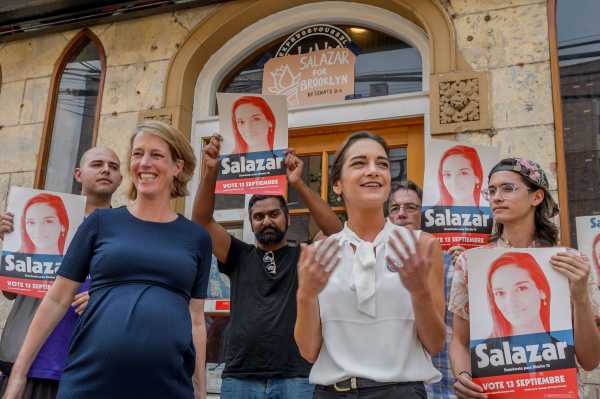
Julia Salazar is a Democratic candidate for New York’s 18th state Senate District, a part of Brooklyn containing neighborhoods ranging from wealthy Williamsburg to impoverished Cypress Hills. Normally, local races don’t receive a lot of national attention — but Salazar’s is different because of her tight affiliation with the Democratic Socialists of America (DSA).
Salazar identifies as a socialist and sees herself as “actively working to dismantle” capitalism. She’s a community organizer by background and is hoping to unseat incumbent Martin Malave Dilan in the September 13 Democratic primary. The comparisons between her and political phenom Alexandria Ocasio-Cortez, another late-20s socialist Latina politician from New York City, practically make themselves. Salazar’s biography is arguably even more interesting than Ocasio-Cortez’s: She identifies as Jewish and has repeatedly described herself as coming from a working-class immigrant background.
But what if she is none of those things — neither working class nor immigrant nor Jewish?
That’s the question raised in a series of articles, starting with an August 23 piece in the Jewish publication Tablet, that have dug into Salazar’s background. In the Tablet piece, reporter Armin Rosen examined her family history and college time and concluded that her identity was “largely self-created”: that she is not an immigrant, and that she doesn’t actually come from a Jewish background. Rosen even quoted the candidate’s brother, Alex Salazar, to support his claims.
In an August 30 piece, City and State New York reporters Zach Williams and Ben Adler dove even deeper into her claims about her family background, interviewing her mother and her brother. The reporters claimed to have uncovered a pattern of dishonesty from Salazar about her background, saying that she offers “a selective presentation of the truth” and has “deployed her facts to gain maximum political advantage.”
This might seem like a straightforward case of a politician getting caught in lies. But Salazar has spent the days since the Tablet and City and State articles defending herself — at times persuasively, at times not — against the charges leveled in the pieces. I spent more than an hour with her on the phone, discussing the details of her story in granular detail. She insisted she was telling the truth.
“I was genuinely shocked [by the Tablet piece], and obviously deeply hurt on a personal level,” she told me.
This family dispute has become an issue of national interest, and not just because a lot of people who work in media happen to live in or near her district. Salazar’s fortunes are being seen by some political observers as a bellwether of the strength of the insurgent American left and socialist movement.
Brooklyn is a stronghold of young American progressivism, so the fortunes of the candidate the DSA chose to back in this district do matter — and whether she’s perceived as a liar by voters in her district really could affect that. And the debate over her Judaism raises a separate set of fraught issues, about who does and doesn’t count as “Jewish” for the American Jewish community.
What follows is an attempt to untangle the mess of accusations and counteraccusations: to try to explain what’s true about Salazar’s self-portrayal, what’s false, and what can’t be proven — as well as the reasons any of this matters.
The Salazars: working-class immigrants, or middle-class Floridians?
Julia Salazar was born in South Florida, just as the Cold War wound down (she’s 27 now). Her brother, Alex, was born two years earlier. Their father, Luis, was a naturalized citizen who had immigrated from Colombia. Their mother, Christine Salazar, is originally from New Jersey. Luis and Christine divorced while Julia and Alex were young, and Christine became the lead parent.
Already, some of those facts — which Julia and Alex agree on — contradict some things Salazar has said about herself. “I immigrated to this country with my family when I was very little,” she said at one campaign stop. “My family immigrated to the US from Colombia when I was a baby,” she said in an interview with Jacobin magazine. Those statements imply that she was born in Colombia, which is not true.
When you ask Salazar about this, she explains that she was shorthanding a more complicated story. She claims that she and her family shuttled back and forth from Colombia — her father worked as a cargo pilot, sometimes flying planes full of flowers between Medellin and Bogota. The family would join him in Colombia, despite living in the United States, and stay at Luis Salazar’s family home.
“It really shaped my early life, and we spent a lot of time there,” Julia said in one of our conversations. “To me, Colombia … was always my family’s home, when we were kids.”
Indeed, this is the story she has consistently told reporters. Emma Whitford, a Brooklyn-based reporter who interviewed Salazar months before the controversy, tweeted a transcript of their conversation — in which Salazar goes to great lengths to explain that she was, in fact, born in Miami:
If that’s all there was to it, it would be reasonable to say that she’s been using “my family immigrated from Colombia” as a shorthand for a much more complicated background. That’s probably sloppy, but not necessarily dishonest.
One problem with this interpretation is that she has fudged her immigrant story in other ways. In a recent interview with Jewish Currents, she said, “I was born in Miami and we didn’t all have permanent residence in the US.” This seems to suggest that her father wasn’t a citizen, which isn’t true. Salazar claims she was referring to the fact that her father was in Colombia frequently, not (as it seemed) his citizenship.
“I can see how this could be misconstrued. I wasn’t seeking to comment on my father’s immigration status,” she told me.
The bigger problem, though, is that her brother denies spending very much time in Colombia as a child. He says Julia’s characterization of their childhood visits to Colombia is “not at all” accurate.
“We visited a couple times,” he told me. “I was baptized there when I was an infant, and we visited maybe a couple times as toddlers — or when I was a toddler. Then we visited once in 1992, and then again in 1998, I believe it was, for about five days” — a depiction that seems at odds with his sister’s claim that “we spent a lot of time there.”
It’s very difficult to prove these childhood experiences either way. City and State got ahold of Christine Salazar, who denied ever living with her husband in Colombia (as Julia had once suggested they had on Twitter).
“Maybe she was just referring to going there more than we went anywhere else,” Christine said of her daughter, per City and State. “Julia really embraced the Colombian culture.”
These comments aren’t unequivocal, though, as they don’t speak to the amount of time spent in Colombia (the key dispute between Alex and Julia). What’s more, Julia told me that her mother agrees with her characterization of their childhood, that Christine “understands that my memory, as a young child, was of us living in Colombia.”
I’ve reached out to Christine for clarification but as of publication time have not heard back.
This isn’t the only dispute between the siblings about their upbringing. Julia Salazar has frequently referred to her background as “working class,” whereas Alex said he would call them middle class.
The issue here is interpretive rather than factual. Luis earned a decent salary as a pilot, according to all the Salazars, but since Christine raised the kids, they only saw a portion of that money through alimony and child support. They grew up in a fairly large home in a nice city — Jupiter, Florida — but Christine at times had to push hard to make ends meet, working primarily as a pharmaceutical sales rep with occasionally a second job with a catering company.
“When we were growing up, our class status changed up and down — quite a lot,” Julia told me. “My brother very selectively mentions a time where my parents, collectively, made $100,000 in a year — but it was not by any means always that way.”
Alex thinks Julia is the one with the faulty memory. “My mom certainly worked very hard. But if we’re talking about what class level we were at, you’d have to have a pretty wide definition of working class — to include everyone other than millionaires, or something like that,” he said. “We lived a comfortable life, I’ll put it that way.”
When I asked Julia why her brother remembered things so differently, she accused her brother of having political motivations, of dissembling to hurt her campaign.
“I love my brother, [but] he has very right-wing politics. Very anti-socialist politics,” she said.
Alex refused to comment on the nature of his political beliefs, but he said the very idea that he was attacking his sister for political reasons was offensive.
“My political stuff is private to me, and it would never motivate me to say anything negative about my sister,” he said, his voice heavy with emotion. “Politics have nothing to do with telling the truth about my family.”
This detailed dispute may seem insignificant, but Salazar’s honesty matters in the same way that any candidate’s would: It speaks to whether voters should trust them with power. And this case is arguably higher-stakes than your standard-issue dispute. A socialist falsely claiming to be a working-class immigrant — one who has built her candidacy on her claim to be the best person to represent a racially and economically diverse district — would feel like a particularly significant betrayal of trust.
I’m not saying Julia is, in fact, lying. It’s clear she’s made some misstatements, and that those misstatements tend to run in the direction of giving her a more compelling personal story. But on the core issues of fact — how much time their family spent in Colombia, what the Salazars’ household income was — the reporting so far isn’t thorough enough to prove Julia wrong and Alex right (or vice versa).
What I am saying is that the stakes of what’s essentially a family dispute have become elevated, to the point where answers that might have once felt like Salazar trivia are now vital to a very public election that transcends its local nature.
Julia at Columbia: is she Jewish?
Both Salazar children were raised Catholic. But after Luis Salazar died, when Julia was 18, she recalls experiencing a crisis of faith. She remembers talking to her father about their last name when he was alive, and him telling her that it was a common name among Sephardic Jews — Jews of Spanish or Middle Eastern descent. Alex, for his part, remembers having no such conversations with his father and is skeptical that Julia did.
Julia was starting at Columbia University and figured New York would be a good place to get in touch with her possibly Jewish roots. She got involved with pro-Israel activism, a cause she would later renounce, and became a frequent presence at Hillel, the main hub for campus Jewish life.
“By early 2010,” she told me, “I [was] even going to services with friends.”
At this point, Julia said, she had started thinking about identifying as Jewish — though she didn’t identify as such publicly for some time. Indeed, as the Tablet article points out, there is some evidence against her claim from as recently as 2012, including statements from people who said they knew her:
This is the core of the allegation that she had fabricated her Jewish identity, one Julia strongly denies. She does not know who Tablet’s anonymous source was and vehemently denies being a practicing Christian who said things like “praise Jesus.” In fact, she told me, she likely would have publicly identified as “agnostic” at that point.
The tweets containing Christian references, she says, were the result of her reading Christian Scripture and apologetics for academic purposes. The same preserved tweets from 2012 also show her discussing events at Hillel, backing up her story that she was involved in campus Jewish life.
The Tablet piece points to a mysterious shift in Salazar’s self-conception occurring in 2013, “just a few months” after a trip to Israel. “By September of 2013,” Tablet’s Rosen writes, “she said she kept kosher at her apartment.”
According to Salazar, there is a simple explanation for this seemingly jarring transition: She formally converted to Judaism.
In mid- to late 2013 — she doesn’t remember when, exactly — she took a b’nai mitzvah course (the Jewish ritual for becoming a Jewish adult) that, if completed, would amount to a conversion. Some reporting had implied that Salazar only took two months of the course and did not complete it; she told me it was “more like five months” and that she definitely completed all the required work.
I could not independently verify Salazar’s account. Rabbi Daniel Kirzane, who was then the rabbinic intern at Columbia’s Hillel, supervised the course; he wrote me an email saying he had “no comment at this time” on Salazar. Neither Columbia-Barnard Hillel nor Rabbi Yonah Hain, Hillel’s rabbi, responded to repeated attempts to contact them.
But Salazar appears to have lived a Jewish life since graduating Columbia. She’s spent a significant amount of time working for a Jewish activist group, Jews for Racial and Economic Justice. And the business of casting doubt on someone’s Judaism — particularly a Jew of color — is quite dubious.
There is a long tradition of gatekeeping in the Jewish community, one that particularly targets religious liberal Jews and Jews of color. Salazar is a Reform Jew (as am I), the most theologically liberal of the three major American Jewish denominations. Some more traditional Jews do not consider Reform conversions to be valid and would deny Judaism to anyone converted under Reform practices. American Jewry is also dominated by a European-descendant establishment, despite a significant and growing population of Jews of color who can have real problems feeling accepted in the community.
These are sources of tremendous tension and division inside the Jewish community and perhaps explain why the Tablet article never outright denies that Salazar should be considered Jewish. Tablet’s editor-in-chief, Alana Newhouse, denied that the article was an exercise in gatekeeping, saying in an interview that “we have no test of, or opinions about, ‘who is or isn’t a Jew.’” (
But the Tablet article was received quite differently by the general public. You can find a number of tweets comparing Salazar to Rachel Dolezal, the white woman who claimed to be black. The Forward, a major American Jewish publication, published a piece claiming Salazar does not “meet the standard for Jewish identity.” New York Times opinion editor Bari Weiss wrote that Salazar did not seem to be Jewish in a widely circulated tweet:
Tablet clearly wanted the conversation to be about Salazar’s trustworthiness rather than a public litigation of her Jewishness. Yet that’s what ended up happening, a case study in why this kind of conversation is so fraught.
All that said, there are still some clear factual problems with Salazar’s comments on her Judaism. Tablet’s Rosen points to a 2014 post on the anti-Zionist site Mondoweiss written by a “Julia Carmel,” whose Twitter page appears to be Salazar’s. (“Reach me at @SalazarSenate18 instead,” the profile states.) Under that post is a comment by an account bearing Salazar’s name saying that “like most American Jews, I was raised with the delusion that Israel was a safe haven for me, perhaps even the only safe place for Jews.” The implication here is that she was raised Jewish as a child, when she in fact was not.
That certainly is not the most honest portrayal of her past. It’s consistent with the somewhat loose way in which she talks about her family history, throwing around words like “immigrant” when they don’t apply. Whether that gives others license to deny her Jewish identity full stop, in the absence of clear proof that she’s lying, is a different story entirely.
The Salazar campaign: why any of this matters
The Julia Salazar campaign is a big deal for the left. She’s been the subject of very friendly interviews in popular left outlets like Jacobin, whose reading groups she used to attend, and the podcast Chapo Trap House.
Salazar is also longtime DSA activist, having served on the organizing committee of the DSA’s socialist-feminist working group. She has campaigned with Cynthia Nixon, the actress and progressive candidate for governor. She has been endorsed by soon-to-be US Rep. Alexandria Ocasio-Cortez, who has done campaign events with her even after the Tablet controversy broke out.
That last endorsement, in particular, sets the stakes at work in this candidacy. According to Salazar, it was Ocasio-Cortez’s victory that attracted significant amounts of media attention and public enthusiasm about her campaign in the first place.
“After Alexandria Ocasio-Cortez … we received a flood of support,” Salazar said. “That momentum sort of naturally translated to my campaign.”
Her most prominent backers, including the New York DSA and Ocasio-Cortez, appear to be standing by her even after the controversy. Prominent socialists, like Jacobin editor-in-chief Bhaskar Sunkara, have defended her on social media:
Whether Salazar likes it or not, her campaign has become another proof of concept for socialism in America. If she wins, it’ll be more evidence that socialists in general and the DSA in particular are forces to be reckoned with in the Democratic Party. If she loses — well, then the DSA will be the socialists who couldn’t even win an election in Bushwick.
Sourse: vox.com






